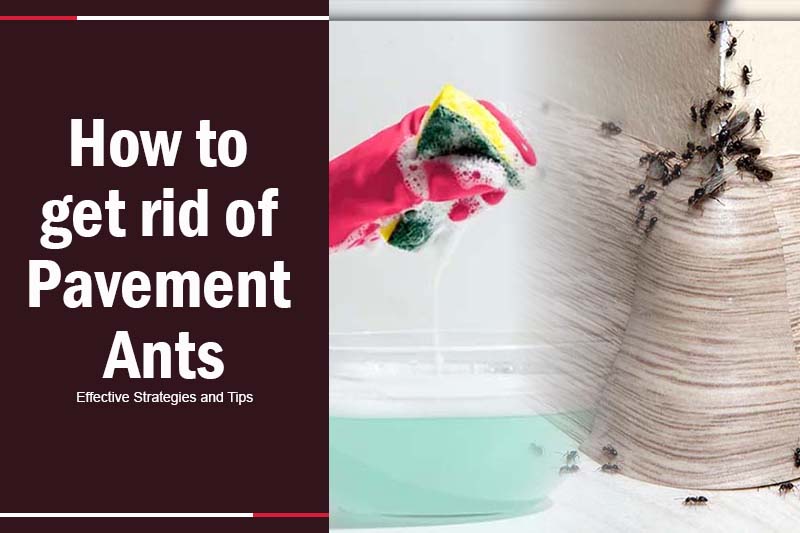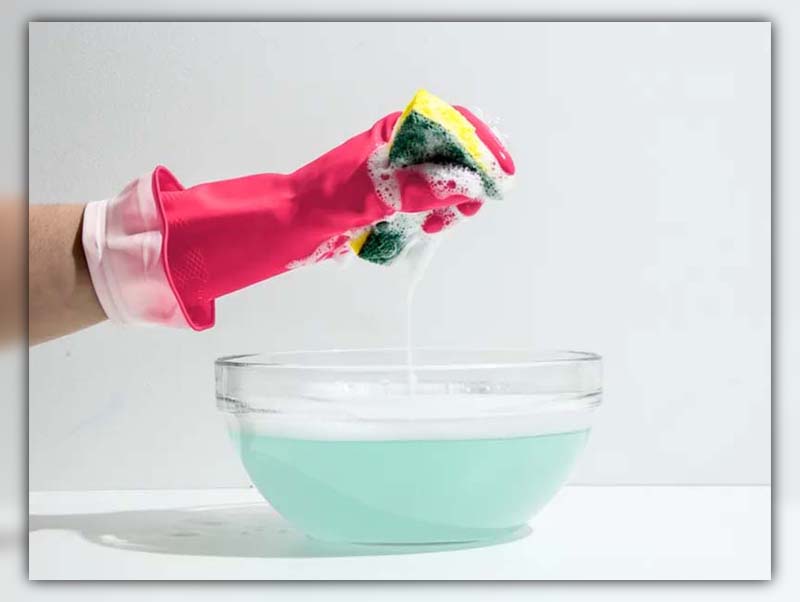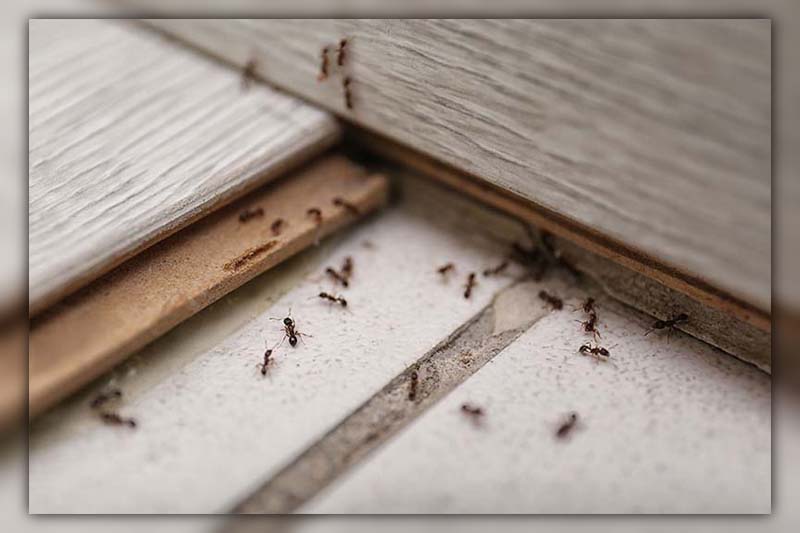Are pesky pavement ants invading your space, turning your home into an unwanted picnic ground? Do you find yourself battling these tiny, persistent invaders every year, wondering how to reclaim your territory? If you’re tired of these uninvited guests, you’re in the right place.
In our blog, “How to Get Rid of Pavement Ants” we’ll provide you with a comprehensive guide to evicting these unwanted visitors once and for all.

Home Remedies and Natural Methods to Get Rid of Pavement Ants
Water and Vinegar Spray
You can use natural ingredients, like vinegar, in a spray to eradicate pavement ants from your home, just like synthetic pesticides. Mix equal parts of water and vinegar in a spray bottle and apply it to areas where ants are likely to hide or travel.
The strong odor of vinegar is overwhelming for worker ants, and it disrupts their pheromones, which are essential for communication. When vinegar is sprayed, it overwhelms the pheromones left by worker ants that create scent trails to food sources.
Boiling Water and Dish Soap
A targeted and natural method for eliminating pavement ants involves using boiling water and liquid dish soap. This approach is most effective when you’ve detected a pavement ant invasion early, as the water may not penetrate deep enough into the ground to eradicate the entire ant colony.
To use this method, bring a kettle of water to a boil and add liquid dish soap to create a soapy mixture. Once it’s sudsy, carefully take the pot outdoors and pour it into the entry points of pavement ant colonies.
Ant Repellent Spray with Essential Oils
Peppermint oil, citrus oils, and tea tree oil are among the top essential oils for deterring pavement ants. These oils are also effective against a variety of other pests, including ants, roaches, spiders, and other insects.
To create your own essential oil spray, you’ll need 10 to 20 drops of one of the aforementioned oils, 2 cups of water, and a spray bottle. Combine these ingredients in the spray bottle and apply it around your home, along sidewalks, or in areas where you’ve noticed pavement ants.
Alternatively, if you prefer not to make a spray, you can soak cotton balls in one of the mentioned oils and place them near the entry points of pavement ant nests. You can also use these scented cotton balls to deter ants by positioning them near windows, doors, and other potential entry points inside your home.
Coffee Grounds
The potent aroma of coffee is another effective deterrent for pavement ants. If you’re looking for a natural way to discourage these pests without resorting to pesticides, consider placing coffee grounds directly around your pathways and at the entrances and openings of any colonies you’ve identified.
Coffee grounds contain approximately 2% nitrogen, which causes a burning sensation in the ants’ legs when they walk over them. However, it’s worth noting that coffee can be harmful if ingested by curious pets, so if you have dogs or cats, we don’t recommend using this method.
Peppermint
Peppermint has a well-established reputation as a natural insect repellent. Pavement ants have an aversion to it because, similar to vinegar and coffee grounds, it disrupts and obliterates the ant tracks and trails used by foragers and worker ants. Planting these herbs around your house’s perimeter can discourage them from nesting in your yard.
Chalk
Chalk, containing calcium carbonate, bewilders pavement ants by concealing or erasing their pheromone trails. You can sketch lines on your windowsills, cracks, doorframes, and any potential entry points they might use.
Corn Meal
Pavement ants, much like other ant species, possess limited vision or are completely blind. They rely on their antennae and scent trails for communication. While cornmeal may not directly kill the ants, it effectively disrupts their scent path or pheromone trail.
It’s important to understand that this process isn’t immediate, and it may take several days for pavement ants to stop approaching your home. Additionally, it’s worth mentioning that cornmeal doesn’t cause ants to explode when they consume it.
Bay Leaves
Managing ant populations can be effectively done using fresh bay leaves, although dried bay leaves can also serve the purpose. Simply position bay leaves in areas where ants are commonly seen, such as cupboards, countertops, and floors.
To enhance the effectiveness, grind the bay leaves into a fine powder using a food processor and sprinkle this over the tops of all ant mounds. Regularly inspect the bay leaves and replace them as necessary, as their scent may fade over time. By replenishing them when needed, you can ensure that the ants stay at bay.
Diatomaceous Earth
Utilizing diatomaceous earth powder is an eco-friendly, natural, and safe method for deterring pavement ants from your home. To protect your residence from these intruders, simply sprinkle the powder at various entry points and gaps within the house.
Raw Cream of Wheat
The substance expands in their stomachs as they consume it, causing their demise over time.
To attract and eliminate pavement ants, mix 1 tablespoon of honey with 3 tablespoons of raw cream of wheat and place it in their habitats. Gradually, your ant problem will diminish.
Herbs and Spices
To deter pavement ants from infiltrating your home, utilize ant-repellent spices and plants. Place insect-repelling herbs at the entry points of their colonies to discourage them from settling.
Whole cloves, bay leaves, cinnamon, turmeric, cayenne pepper, citrus oil, lavender oil, and other ant-repellent herbs and spices are some examples. Replace them in the same location as a pavement ant deterrent when these herbs or spices lose their potency.
Pavement Ants Prevention
Indoors
To prevent pavement ants from entering your home, take these proactive steps:
- Seal any holes, gaps, cracks, or potential entry points.
- Maintain a clean, dry, and cool environment, especially in areas where food is present.
- Keep your kitchen spotless by wiping countertops after every meal.
- Quickly clean up spills and crumbs from floors.
- Avoid leaving dirty dishes in the sink.
- Address any household water leaks, as they can serve as a water source for pavement ants.
- Remove any construction debris, bricks, or concrete slabs near your home to eliminate potential nesting sites for pavement ants.
Outdoors
Here are essential steps to deter pavement ants from your home:
- Prune grasses, shrubs, and crawling plants that can act as bridges for ants.
- Secure trash containers tightly and empty them daily.
- Eliminate standing water sources in and around your home.
- Trim tree branches away from your house to prevent ant access.
- Ensure your home’s weatherproofing and window screens are intact.
- Store firewood and yard debris at least 20 feet away from your house’s perimeter.
Conclusion
Now you’re armed with the knowledge and strategies on “How to Get Rid of Pavement Ants” . Whether you opt for natural remedies, essential oils, or simple preventive measures, an ant-free home is within your reach.
For more insights on dealing with common household nuisances, check out Pestweek‘s other blogs. Your journey to a pest-free haven has just begun.

Calina Mabel has over 15 years of experience in the field of journalism and communications. Currently, Calina Mabel is the Content Writer for categories such as Cockroach, Ants, Bed Bugs, Mosquito, Rodent, Termite, and Flies on Pestweek.com. She aims to build content for these categories with a focus on providing valuable and accessible information to readers, in order to create the world’s largest knowledge community about Pests.
All content written by Calina Mabel has been reviewed by Emily Carter.




